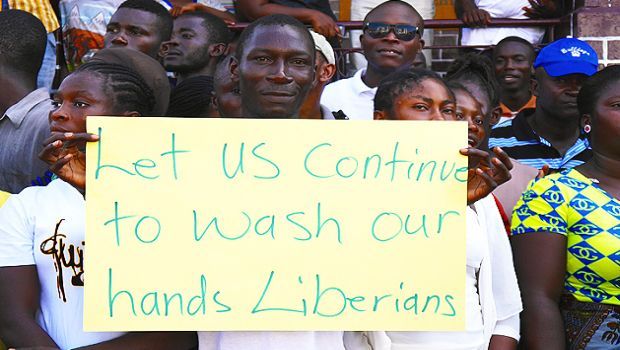WHO Declares Ebola Transmission in Liberia is Over
Today, Sept. 3, 2015, the World Health Organization (WHO) has declared Liberia to be free of Ebola virus transmission in the human population. Forty-two days have passed since the second negative test on July 22, 2015 of the last laboratory-confirmed case. Liberia now enters a 90-day period of heightened surveillance.


Liberia is free of Ebola transmission but the importance of hygiene continues. Photo courtesy of WHO/M. Winkler
Today, Sept. 3, 2015, the World Health Organization (WHO) has declared Liberia to be free of Ebola virus transmission in the human population. Forty-two days have passed since the second negative test on July 22, 2015 of the last laboratory-confirmed case. Liberia now enters a 90-day period of heightened surveillance.
Liberia’s ability to effectively respond to the outbreak of Ebola virus disease is due to intensified vigilance and rapid response by the government and multiple partners. Transmission had been declared over previously on May 9, 2015, but the disease re-emerged on June 29 and six additional cases were identified.
On June 29, 2015, midway through the first 90-day period, a routine post-mortem swab taken from a 17-year-old male, who died on June 28, tested positive for Ebola virus disease. Upon confirmation of this positive case, a specialized team was immediately dispatched and undertook a detailed investigation.
Under the leadership of the Liberia Government authorities, an effective response was rapidly initiated to contain the new outbreak. Members of the community were engaged and effectively contributed to contact tracing and social mobilization. International partners supported the government in areas such as technical assistance, provision of personnel, food, supplies and equipment. Ultimately, an additional five cases arose out of this re-emergence of the disease in Liberia. Out of six cases, there were two deaths. There were no infections or deaths among healthcare workers.
WHO commends the government of Liberia and its people on the successful response to this recent re-emergence. It is in full accord with government calls for sustained vigilance. It will continue to support the country during the 90 days of heightened surveillance that begins Sept. 3, 2015, and in its early recovery efforts.
Source: WHO
Redefining Competency: A Comprehensive Framework for Infection Preventionists
December 19th 2024Explore APIC’s groundbreaking framework for defining and documenting infection preventionist competency. Christine Zirges, DNP, ACNS-BC, CIC, FAPIC, shares insights on advancing professional growth, improving patient safety, and navigating regulatory challenges.
Addressing Post-COVID Challenges: The Urgent Need for Enhanced Hospital Reporting Metrics
December 18th 2024Explore why CMS must expand COVID-19, influenza, and RSV reporting to include hospital-onset infections, health care worker cases, and ER trends, driving proactive prevention and patient safety.
Announcing the 2024 Infection Control Today Educator of the Year: Shahbaz Salehi, MD, MPH, MSHIA
December 17th 2024Shahbaz Salehi, MD, MPH, MSHIA, is the Infection Control Today 2024 Educator of the Year. He is celebrated for his leadership, mentorship, and transformative contributions to infection prevention education and patient safety.
Pula General Hospital Celebrates Clean Hospitals
December 16th 2024Learn how Pula General Hospital in Croatia championed infection prevention and environmental hygiene and celebrated Clean Hospitals Day to honor cleaning staff and promote advanced practices for exceptional patient care and safety.
Understanding NHSN's 2022 Rebaseline Data: Key Updates and Implications for HAI Reporting
December 13th 2024Discover how the NHSN 2022 Rebaseline initiative updates health care-associated infection metrics to align with modern health care trends, enabling improved infection prevention strategies and patient safety outcomes.